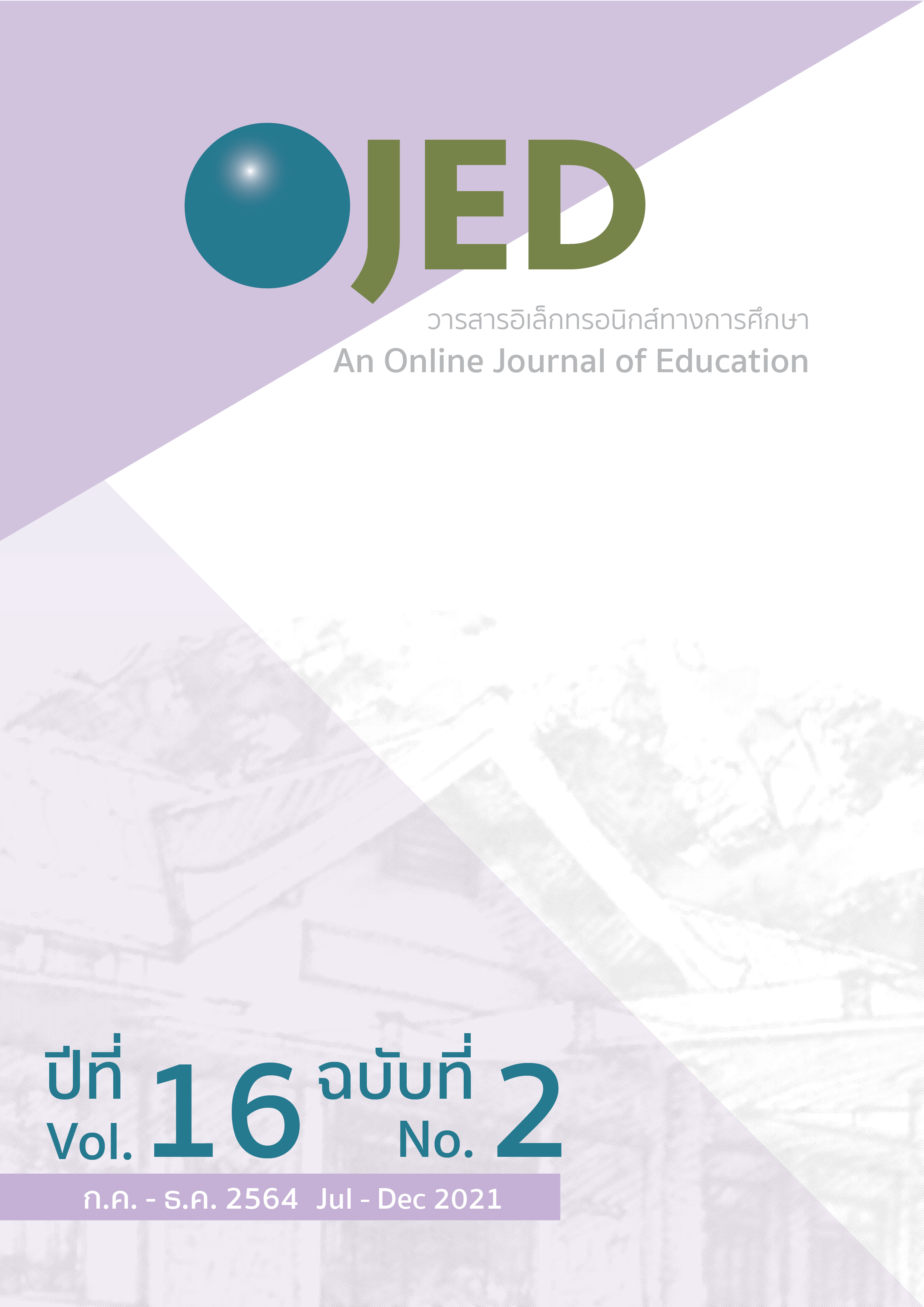Effects of Organizing Mathematics Learning Activities Using REACT Strategies on Mathematical Connection Ability of Eighth Grade Students
DOI:
https://doi.org/10.14456/ojed.2021.18Keywords:
REACT strategies, mathematical connection abilityAbstract
The purposes of this research were 1) to compare mathematical connection ability of the students before and after organizing mathematics learning activities using REACT strategies, 2) to compare mathematical connection ability of the student after organizing mathematics learning activities using REACT strategies to the 60%, 3) to study the development of mathematical connection ability of the students between during organizing mathematics learning activities using REACT strategies. The subjects were 34 eighth grade students. The experimental instruments were the lesson plan focusing on organizing mathematics learning activities using REACT strategies. The data were collected by using the mathematical connection ability tests. Such the data so obtained were analyzed by using arithmetic mean, standard deviation, t-test, and by content analysis. The results of the research revealed that 1) the mathematical connection ability of the students after organizing mathematics learning activities using REACT strategies were higher at a .05 level of significance, 2) the mathematical connection ability of the students after organizing mathematics learning activities using REACT strategies were higher than 60% at a .05 level of significance, 3) the mathematical connection ability of the students organizing mathematics learning activities using REACT strategies have been improved to the positive direction.
References
กระทรวงศึกษาธิการ. (2560). ตัวชี้วัดและหลักสูตรแกนกลาง กลุ่มสาระการเรียนรู้วิทยาศาสตร์ (ฉบับปรับปรุง พ.ศ. 2560) ตามหลักสูตรแกนกลางการศึกษาขั้นพื้นฐาน พุทธศักราช 2551. กรุงเทพมหานคร.
จรรยา ภู่อุดม. (2545). แนวการจัดการเรียนการสอนและการประเมินที่สอดคล้องกับสาระที่ 6 ทักษะ/กระบวนการทางคณิตศาสตร์. วารสารคณิตศาสตร์, 46, 14-37.
พีระพล ศิริวงศ์. (2552). การพัฒนาบทเรียน e-Learning สำหรับการสอนวิชาคณิตศาสตร์ 2. อุบลราชธานี: คณะวิทยาศาสตร์ สาขาวิชาคณิตศาสตร์ มหาวิทยาลัยราชภัฏอุบลราชธานี.
สถาบันส่งเสริมการสอนวิทยาศาสตร์และเทคโนโลยี. (2563). สรุปผลการวิจัย PISA 2018. กรุงเทพมมหานคร.
สถาบันทดสอบทางการศึกษา. (2563). สรุปผลการทดสอบทางการศึกษาระดับชาติขั้นพื้นฐาน (O-NET) ชั้นมัธยมศึกษาปีที่ 3 ปีการศึกษา 2562. กรุงเทพมมหานคร.
อัมพร ม้าคนอง. (2553). ทักษะและกระบวนการทางคณิตศาสตร์ : การพัฒนาเพื่อพัฒนาการ. กรุงเทพฯ: ศูนย์หนังสือแห่งจุฬาลงกรณ์มหาวิทยาลัย.
Crowford, M. (2001). Teaching contextually: Research, rational and techniques for improving student motivation and achievement in mathematics and science. CCI. Publishing. Inc. ww3. templejc. edu/prodev/distance-ed/crawford. pdf.
Kennedy, L., & Tipps, S. (1994). Guiding children's learning of mathematics Belmont, CA: Wadsworth. In: Inc.
National Council of Teachers of Mathematics [NCTM]. (2000). Principles and standards for school mathematics (Vol. 1): National Council of Teachers of Mathematics.
Sears, S. J. (2003). Introduction to contextual teaching and learning (Vol. 504): Phi Delta Kappa Educational Foundation Bloomington.
Torrejon, & Gloria. (1997). Connection within Mathematics. Retrieved from http://learner.org/channel/courses/teachingmath/grades_2/session_o.
Utami, W. S. (2016). React (Relating, Experiencing, Applying, Cooperative, Transferring) Strategy to Develop Geography Skills. Journal of Education and Practice, 7(17), 100- 104.
Downloads
Published
How to Cite
Issue
Section
License
Copyright (c) 2021 An Online Journal of Education

This work is licensed under a Creative Commons Attribution-NonCommercial-NoDerivatives 4.0 International License.




